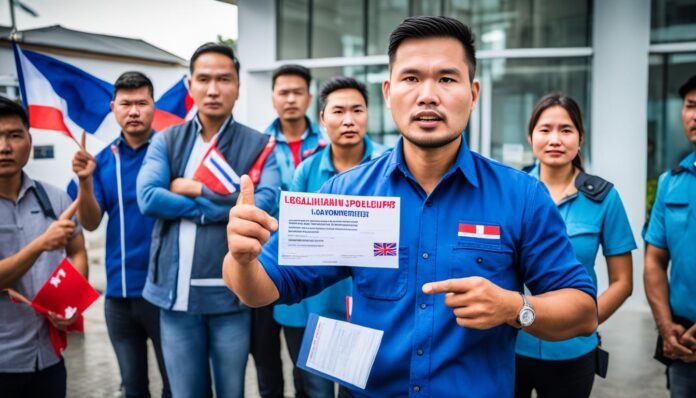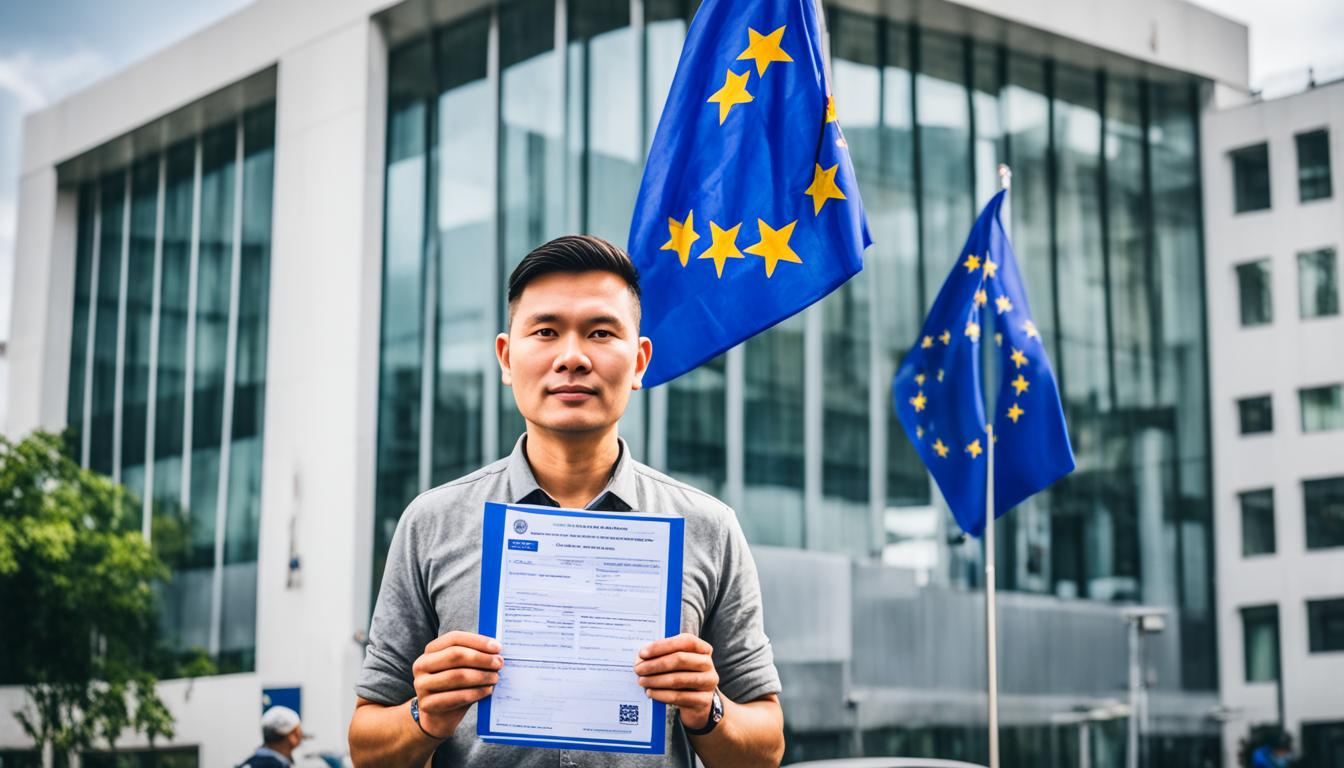
The European Union helps Laos work toward better lives for its people. It focuses on creating jobs in the eco-friendly economy. By joining hands with ASEAN at EU-level, Laos gets to benefit from many EU help programs. To work in Europe, Laotians need to follow specific rules. This includes getting the right work permits, knowing their work rights, and sticking to work laws.
Key Takeaways:
- Laotian citizens who want to work in Europe need to obtain work visas.
- Each European country has its own set of employment laws and regulations that Laotian citizens must adhere to.
- Laotian workers in Europe are entitled to certain rights and protections under employment laws.
- The visa application process for Laotian citizens working in Europe usually involves gathering the required documents and submitting them to the embassy or consulate.
- Laotians working in Europe may face various challenges and risks, including language barriers and discrimination.
Work Visas for Laotian Citizens in Europe
Laotians wanting to work legally in Europe must get a work visa. The visa rules vary by country in Europe. Typically, Laotians apply for a work visa at the embassy or consulate of the country they want to work in.
To apply, they must submit an application, show a job offer, and pay fees. They need to look up the visa rules for the specific country. This makes the application process easier.
Visa Application Process
For Laotians to work in Europe, they must follow a certain visa process. They need to gather needed documents and fill out a form. Then, they submit these to the embassy or consulate where they will work.
The exact documents and rules vary by country. But usually, they need a valid passport, job proof, financial papers, and any health or crime certificates. Laotians should start the visa process early. And they need to make sure they have all the documents they need.
Visa Requirements
Requirements for Laotians to work in Europe change from country to country. Common documents they need include:
- Evidence of a valid job offer or employment contract
- Proof of sufficient funds to support oneself
- Medical insurance coverage
- A clean criminal record
- A valid passport with at least six months of validity remaining
It’s very important for Laotians to research these requirements well. This helps ensure they get their visa without problems.
After getting a work visa, Laotians can start working in Europe. They need to follow the country’s work laws and know their rights. This ensures they have a positive work experience.
| Country | Visa Requirements |
|---|---|
| Germany | Valid job offer, proof of qualifications, sufficient funds |
| France | Employment contract, proof of accommodation, health insurance |
| United Kingdom | Sponsorship from an employer, English language proficiency, job skill level |
| Spain | Job offer, valid passport, medical insurance |
Rights of Laotian Workers in Europe
Laotian workers in Europe have rights that make sure they are treated fairly and safely at work. These laws are there to stop unfair treatment, keep work conditions safe, and avoid discrimination. Every Laotian worker needs to know these laws to protect themselves and react if needed.
These laws give Laotian workers in Europe rights such as:
- Fair wages: They should earn a wage that’s fair, based on what they know and can do. This should meet the local pay standards and laws.
- Safe working conditions: Employers must make sure the workplace is safe and healthy. This means following all safety and health rules.
- Reasonable working hours: Workers shouldn’t work too much. Long hours shouldn’t harm their health or life outside of work.
- Protection against discrimination: Workers have the right to be treated well, no matter their nationality, race, gender, or religion, and other beliefs.
- Protection against exploitation: Workers should not face unfair treatment like being forced to work, not getting paid, or being taken advantage of.
It’s key for Laotian workers to understand their work rights. They should learn about the specific employment laws of the country they work in. This can vary in different parts of Europe. Knowing their rights helps workers act fast if someone breaks the law and get help from legal experts or groups that fight for workers.
Key Takeaways:
- Laotian workers in Europe can expect fair wage, work in safe places, have reasonable schedules, and be treated equally. They are also protected against unfair work practices.
- Knowing the laws of the country they work in is very important for Laotian workers. This helps them understand and protect their rights as needed.
- Getting support from unions, advocacy groups, or lawyers can be very helpful when needing to defend their rights.
Comparison of Employment Laws for Laotians in Select European Countries
| Country | Minimum Wage | Maximum Working Hours | Protection Against Discrimination | Workers’ Rights Organizations |
|---|---|---|---|---|
| France | €10.25 per hour | 35 hours per week | Strict anti-discrimination laws | National Federation of Professional Workers (FNPT) |
| Germany | €9.50 per hour | 48 hours per week | Comprehensive anti-discrimination laws | German Trade Union Confederation (DGB) |
| United Kingdom | £8.91 per hour | 48 hours per week (can opt out) | Equality Act prohibits discrimination | Trade Union Congress (TUC) |
| Spain | €7.14 per hour | 40 hours per week | Strict anti-discrimination laws | Workers’ Commissions (CCOO) |
Note: The information in the table is a guide and might change. Laotian workers in Europe should look up current rules for exact details.
Employment Laws for Laotians in Europe
Laotian citizens working in Europe should know the local employment laws. Each European country has its own rules to protect workers. These laws make sure workers are treated fairly.
The laws cover many things, such as:
- Every European country sets its own minimum wage. It’s the lowest pay employers can offer. Laotian workers need to know their minimum wage rights for fair pay.
- Laws on working hours set the most hours employees can work. They also have rules on breaks. Laotians must know these to avoid overwork and get enough rest.
- Some countries in Europe give workers paid time off. This includes vacation, sick, and parental leave. Laotians should know what they are entitled to.
- There are strict health and safety rules in Europe. These include protection from workplace hazards. Laotians should know these to make sure their work environment is safe.
- When a job ends, there are rules on how it can happen. This is to prevent unfair job loss. Laotians need to understand these rights.
Knowing these laws helps Laotian workers follow them and protect their rights. They should keep up with any law changes to avoid problems.
| Country | Minimum Wage | Working Hours | Leave Entitlements | Health and Safety Standards | Termination Procedures |
|---|---|---|---|---|---|
| Germany | €9.50 per hour | Maximum 48 hours per week | 20 days of paid vacation leave | Strict health and safety regulations | Notice period based on length of employment |
| France | €10.25 per hour | Maximum 35 hours per week | Minimum 5 weeks of paid vacation leave | Rigorous workplace safety standards | Notice period based on length of employment |
| United Kingdom | £8.91 per hour | Maximum 48 hours per week | 28 days of paid vacation leave | Stringent health and safety regulations | Notice period based on length of employment |
If Laotian workers don’t understand the laws, they should get help. They can ask local authorities or legal experts. Following these laws ensures a safe and fair workplace.
Visa Application Process for Laotian Citizens
Laotian citizens looking to work in Europe face a visa application journey. They must gather a list of documents, fill in an application form, and send everything to their target country’s embassy or consulate.
The required documents and steps can change depending on the country. Yet, Laotians usually need to include some common items:
- A valid passport
- Proof of employment or job offer
- Financial documents
- Medical or criminal record certificates, if required
Giving enough time to the visa process is crucial for Laotian job seekers. This avoids any hold-ups or issues that might stop them from working in Europe.

Diligence and focus play a big role in visa applications. They should carefully check each document for the correct and complete information. Mistakes or missing details can slow down or stop the process.
Laotians are advised to contact the embassy or consulate. These places can offer extra help for their specific work country. They can clear up any confusion and answer questions during the application process.
It’s key for Laotians to have all needed documents and meet visa requirements. Not doing so can lead to hold-ups or visa denial. This affects their chance to work in Europe.
Challenges and Risks for Laotians Working in Europe
Working in a new country brings various challenges and risks. Laotians in Europe face these as they look for better work. It’s key for these workers to know the possible issues. Taking steps to avoid problems is important.
The language barrier is a big issue for Laotian workers. Not understanding or making themselves clear can cause problems. This might slow down their career growth too.
Europe and Laos have very different cultures. These differences can cause misunderstandings at work. Learning about and respecting the new cultural norms can help workers fit in better.
Some Laotian workers might face discrimination or exploitation in Europe. This could mean they are treated unfairly or left out. Knowing their rights and getting help if they’re treated badly is crucial.
Employment rules differ across Europe. Laotian workers need to keep up with these changes. Not knowing their rights could lead to being mistreated. Staying informed can help them protect themselves.
Risks for Laotian Migrant Workers in Europe
Moving to Europe for work can be risky for Laotians. They might not get stable jobs or benefits. Their migrant status might also block them from health and social systems.
Not understanding local laws and rights can make work tough for Laotians. They might face bad work conditions or contract issues. Seeking help from rights-based groups is important for their safety.
Seeking Support and Overcoming Challenges
Laotian workers can get help from local services and other migrants. These support systems can aid with work problems and social needs. They’re valuable for adjusting to new countries.
Knowing their rights is crucial for Laotian workers in Europe. Keeping an eye on laws can help them stay protected. It lets them stand up for themselves if wronged.
- Stay informed about employment laws and regulations
- Seek guidance and support from local authorities and organizations
- Connect with fellow migrants for advice and assistance
- Participate in language and cultural integration programs
Being proactive and staying informed is crucial for Laotian migrants. It helps them face challenges and have a better work experience in Europe.
Resources for Laotians Working in Europe
Laotian workers in Europe can find help from different resources and networks. These can help them face challenges and have a great work experience. It’s important to know these resources to work well in Europe.
Government websites are a key info source for Laotians in Europe. They cover work rights, rules, and what visas you need in each country. Visiting these pages help Laotian workers keep up with the law, and know their rights.
Another helpful place is Lao embassies or consulates across Europe. They offer counsel on visas, legal matters, and connect people with help services. Workers can ask for advice that fits their particular situation at these places.
NGOs that help migrant workers are also crucial. They give legal help, stand up for rights, and help with things like homes, health, and learning language. These NGOs are a huge help for Laotians moving to Europe and starting new jobs.
Being part of Laotian community groups can also be very supportive. These groups link you with others from Laos or similar cultures. Here, you can get tips, trade stories, and find help adjusting to work life in a new land.
| Resources for Laotians Working in Europe: | Services Provided: |
|---|---|
| Government Websites | Employment information, visa requirements, legal updates |
| Embassies/Consulates | Visa assistance, legal advice, tailored support |
| Non-governmental Organizations | Legal advice, support services, advocacy |
| Community Groups and Networks | Community connection, advice sharing, support |
By using the resources mentioned above, Laotians in Europe can understand work laws better, get legal aid, and find supportive communities. These tools are there to boost their chances of success in a new work scene. It’s key for Laotians to know and use them for a rewarding work experience in Europe.

Conclusion
Working in Europe as a Laotian citizen demands knowing the legal needs. You must get the right work visas. Also, know the employment laws.
It’s vital for Laotians to learn the country’s work requirements. They should get help and use resources if they face difficulties.
Knowing your rights and duties helps Laotians thrive at work in Europe.
FAQ
What are the legal requirements for Laotian citizens working in Europe?
To work in Europe, Laotian citizens must follow certain rules. This includes getting the right work visas. They should also know and follow the work laws.
How can Laotian citizens obtain work visas for Europe?
Getting a work visa means applying to the country’s embassy or consulate you want to work in. You need to fill out forms, show job papers, and pay fees.
What rights do Laotian workers have in Europe?
Laotian workers have rights like fair pay, safe places to work, and not working too much. They should be treated well and not discriminated against.
What are the employment laws for Laotians working in Europe?
Different European countries have their work laws. Laotian workers need to know and follow these rules. They cover things like pay, hours, and how you quit a job.
What is the visa application process for Laotian citizens working in Europe?
Applying for a work visa means getting all the needed papers ready. You fill out forms and send them to the embassy or consulate of the country you want to work in. Each place might ask for different things.
What challenges and risks may Laotians face when working in Europe?
Working in Europe might be hard because of different languages and cultures. Laotian workers could also face unfair treatment. It’s key to know your rights and get help if needed.
What resources are available for Laotians working in Europe?
There are places to get help like government websites, embassies, and NGOs. These groups offer info, advice, and help for Laotian workers in Europe.
